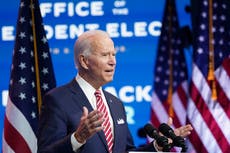House tees up one-week spending bill to avert shutdown as talks continue
McConnell to Democrats: ‘Drop the hostage-taking’ on coronavirus relief and government shutdown-averting spending bills
Your support helps us to tell the story
From reproductive rights to climate change to Big Tech, The Independent is on the ground when the story is developing. Whether it's investigating the financials of Elon Musk's pro-Trump PAC or producing our latest documentary, 'The A Word', which shines a light on the American women fighting for reproductive rights, we know how important it is to parse out the facts from the messaging.
At such a critical moment in US history, we need reporters on the ground. Your donation allows us to keep sending journalists to speak to both sides of the story.
The Independent is trusted by Americans across the entire political spectrum. And unlike many other quality news outlets, we choose not to lock Americans out of our reporting and analysis with paywalls. We believe quality journalism should be available to everyone, paid for by those who can afford it.
Your support makes all the difference.Lawmakers and the Trump White House do not expect to strike a spending deal through 30 September this week so the House is teeing up a Wednesday vote on a measure to avert a government shutdown while talks continue.
Such “continuing resolutions” have been an annual – and, sometimes, even more frequent – staple of Washington’s end-of-year rush. House Democratic leaders are readying a one-week spending measure to keep the federal lights on while all sides keep talking about a massive longterm appropriations bill.
“I am disappointed that we have not yet reached agreement on government funding. The House will vote on Wednesday on a one-week CR to keep government open while negotiations continue,” House Majority Leader Steny Hoyer wrote in a tweet.
Senate Majority Leader Mitch McConnell later announced his chamber also will vote on a one-week measure this week.
“We senators are no strangers to end of the year drama. This time the stakes are even higher,” he added on the floor, referring to a coronavirus relief measure that also is the subject of negotiations and could be attached to the huge appropriations measure if both deals can be struck before Christmas.
Government funding is set to expire on Friday night, though the Office of Management and Budget typically has unspent monies that keep government operations, especially essential ones, running for a few more days. Donald Trump has railed against such shortterm CRs during his term, but has always signed them to prevent another government shutdown.
Mr Trump and Republicans took most of the blame for a 35-day shutdown that briged late 2018 and early 2019. That was the longest lapse in federal funding in US history.
Republicans and Democrats, as well as Trump administration officials, are trying to reach agreement on all 12 annual spending bills. The always-tough task is rife with potential deal-breakers for any of the sides involved as they try to cobble together an “omnibus” measure that can pass both chambers and garner Mr Trump’s signature.
Congress once passed each measure one-by-one as the year progressed, a practice that has gone the way of the dodo as US politics have gotten more and more tribal, with an environment not suited for repeated tough votes and compromise.
Republicans and the White House have pitched multiple Covid-19 stimulus measures, but none as large as the $2trn package Speaker Nancy Pelosi and Senate Minority Leader Chuck Schumer have held out for since May.
Political experts and even some House Democrats say that refusal to budge is a big reason they, defying almost all predictions, lost seats in the House and failed to achieve the four- or five-seat Senate majority that some had forecast.
Mr McConnell criticized Senate Democrats for rejecting what he called a" targeted compromise" for months, the kind of bill he says “would pass by a massive bipartisan margin.”
With unemployment insurance and other Covid safeguard set to expire this month, a group of GOP and Democratic senators last week unveiled a $900m proposal that has become the only game in town and the basis of new Covid talks.
The GOP Senate leader said there is evidence of “hopeful signs of engagement” towards a deal.
“Republicans and Democrats don’t need to resolve every one of our differences,” he said, lecturing the other party to “do what members of Congress do when they’re serious.”
That means “drop the hostage-taking," Mr McConnell said. “That’s what the country is counting on. That’s how we can do right by the American people before Christmas.”
Mr Schumer spoke later and accused Mr McConnell and Republicans of insisting upon “poison pills” that have prevented the two sides from reaching a deal.
“The majority leader has refused to sit down with Democrats and negotiate a solution,” he said, calling Mr McConnell putting GOP-written bills on the floor a take-it-or-leave-it strategy. He also said he and Ms Pelosi have changed their offers multiple times.
Still, he also mentioned “encouraging signs,” saying the GOP and Democratic moderates are “making progress.”
“It’s going to take a willingness to give a little, not just to put your bill on the floor,” Mr Schumer said. “Hopefully, the majority leader can catch up to the more fair-minded members of his party.”
Subscribe to Independent Premium to bookmark this article
Want to bookmark your favourite articles and stories to read or reference later? Start your Independent Premium subscription today.




Join our commenting forum
Join thought-provoking conversations, follow other Independent readers and see their replies
Comments